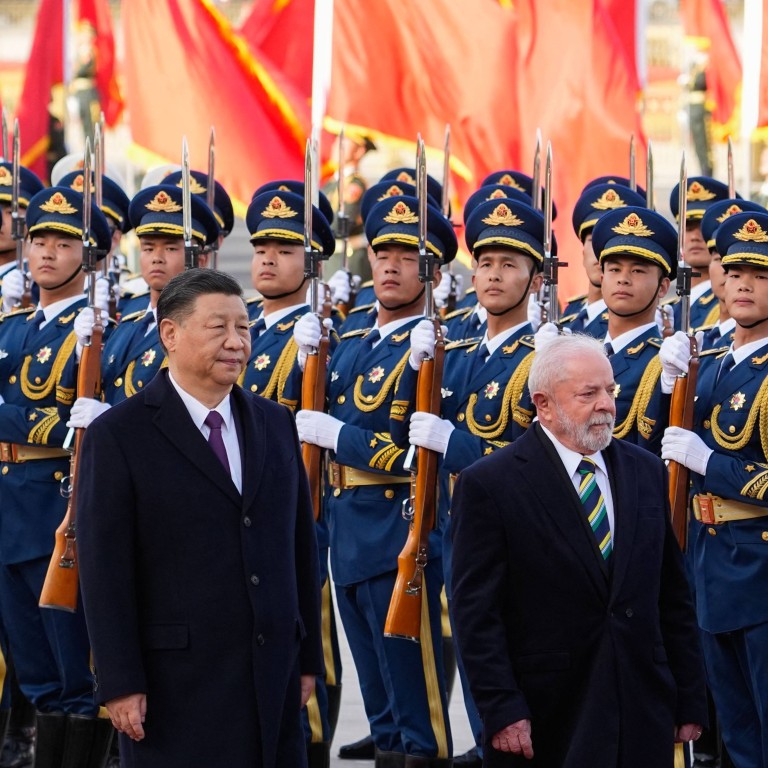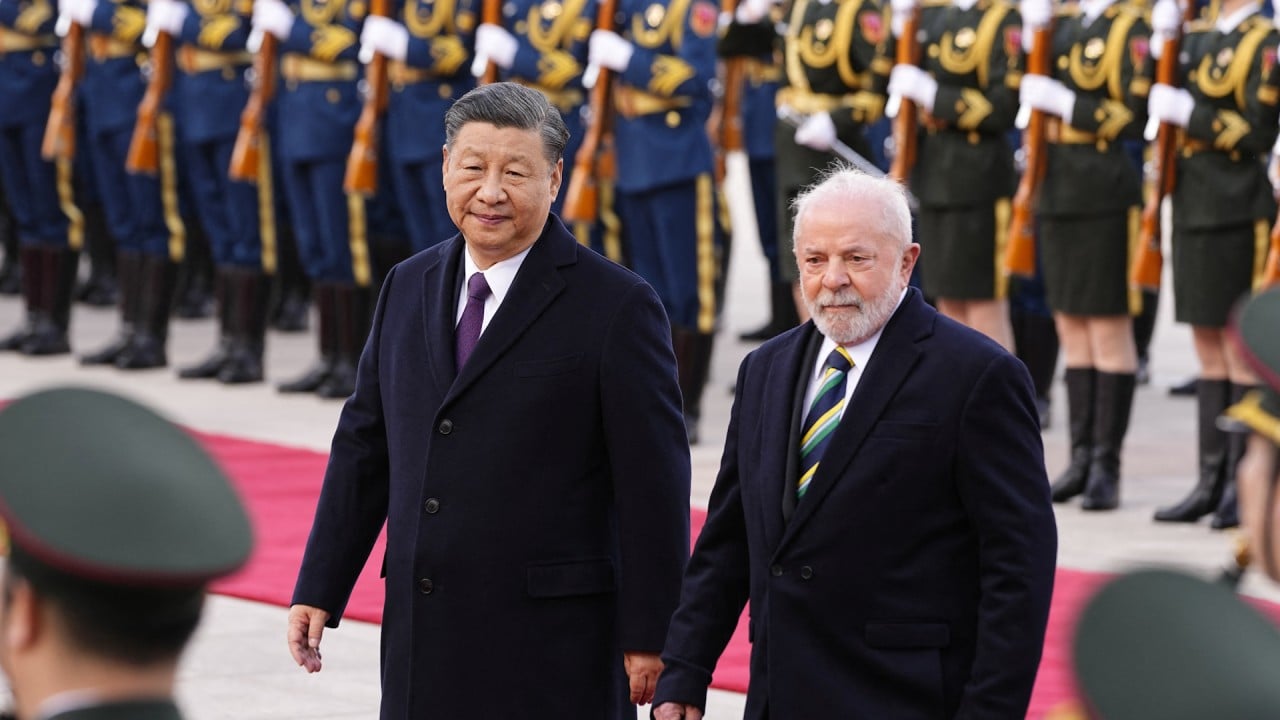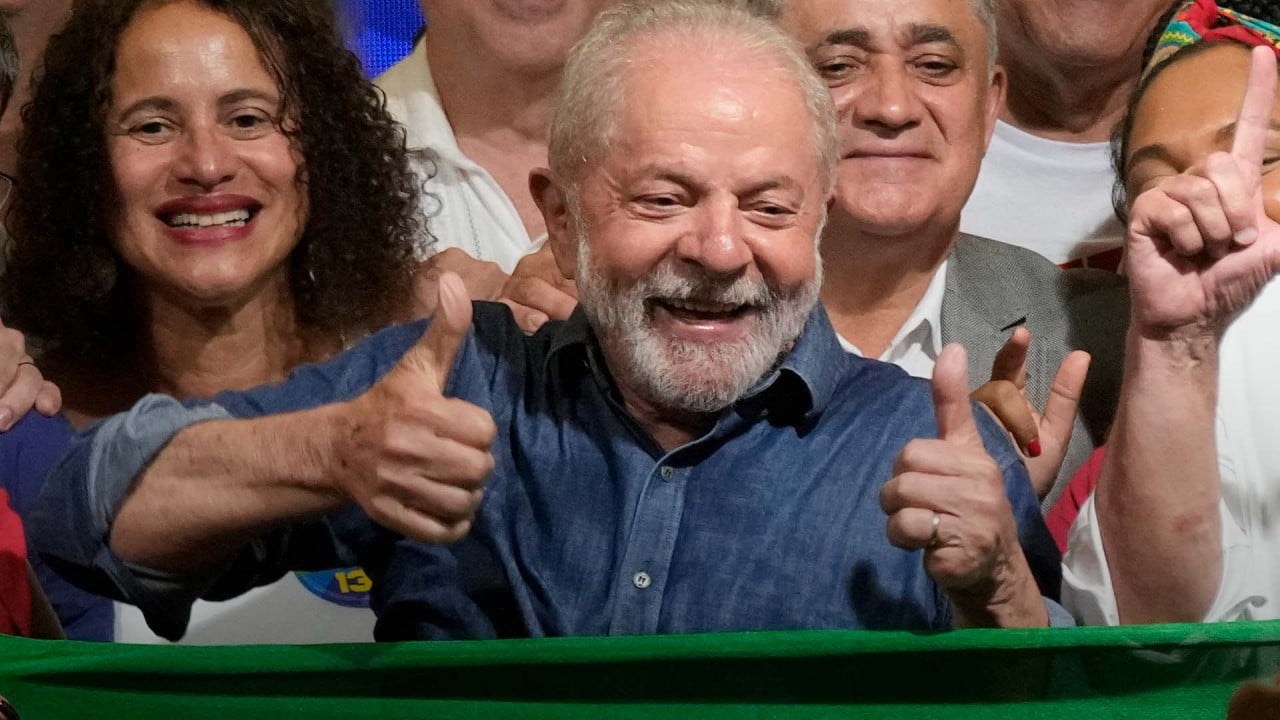
China rolls out red carpet for Brazil’s President Lula, with pledge to elevate ties
- Xi Jinping welcomes his Brazilian counterpart to the Chinese capital, saying relations are a diplomatic priority
- Ukraine and cooperation deals on the agenda during talks at the Great Hall of the People
Xi said that as the biggest developing countries in the eastern and western hemispheres, China and Brazil were “comprehensive strategic partners that share extensive common interests”.
“China always views and develops relations with Brazil from a strategic height and a long-term perspective, and places China-Brazil relations as a diplomatic priority,” he said.
Xi said he would work with Lula to develop new opportunities between the two countries and for the world economy.
“I believe, sustained, healthy and stable development of China-Brazil relations will surely play an active and important role in the peace, stability, prosperity and development of the region and the world,” the Chinese president said.
The two leaders also discussed the Ukraine crisis, and agreed that dialogue and negotiations were the only viable way out of the crisis, state broadcaster CCTV reported.
They also called on more countries to play a constructive role in promoting a political settlement of the crisis, the report said.
After the talks, the two leaders signed a series of cooperation deals covering a number of areas, including trade and investment, the digital economy and aerospace.
China, Brazil to sign more than 20 deals during Lula’s state visit this week
Earlier in the day, Lula met Premier Li Qiang, who said China was willing to strengthen communication and coordination with Brazil on multilateral affairs and make greater contributions to safeguarding the rights and interests of developing countries, China National Radio reported.
After the meeting, Lula tweeted that the two countries would “work to expand trade and balance world geopolitics”.
This year marks the 30th anniversary of the establishment of the strategic partnership between the two countries, and Li said China would take the opportunity to promote all-round, multilevel and high-level cooperation to a new level.
Lula said Brazil attached great importance to its relations with China, and was willing to deepen cooperation with China in politics, the economy, trade, education, science and technology, and culture.
The two countries should also strengthen communication and coordination in international affairs, jointly safeguard the interests of developing countries, and jointly build a peaceful and stable world, he said.
The Brazilian president’s day also included meetings with Zhao Leji, head of China’s national legislature, and Zhang Zhigang, president of China’s State Grid Corporation.
He paid tribute to China’s war heroes in Tiananmen Square, laying a wreath at the Monument to the People’s Heroes.
The Brazilian leader arrived in Shanghai on Wednesday night and attended the inauguration of former Brazilian president Dilma Rousseff as president of the BRICS New Development Bank on Thursday. The bank was established in 2014 by Brazil, Russia, India, China and South Africa to support sustainable development in member countries.
In a speech at the bank on Thursday, Lula criticised the dominant status of the US dollar, saying times had changed and other currencies should play a greater role in the global economy.
“I ask myself every night why all countries are obliged to do their trade backed by the dollar? Why can’t we carry out trade backed by our currency?” he was quoted by Chinese state media as saying.
“Why can’t the New Development Bank extend loans in the currencies of member countries? I know we are accustomed to using the US dollar, but we are in the 21st century, and we can do something different.”
China and Brazil reached an agreement in February to adopt yuan-settlement in transactions, a move deemed to reduce US dollar exposure.
Lula also lashed out at the International Monetary Fund, suggesting that it was too harsh in forcing cash-strapped countries such as Argentina to cut spending in exchange for bailout loans.
During his brief stop in Shanghai, Lula also visited a Huawei wireless communications centre and met executives from BYD, one of China’s top electric car makers.
“Over the past few years, when [Jair] Bolsonaro was the president, Brazil was greatly affected by the US, and hadn’t signed Belt and Road Initiative deals. Now there’s a good chance [Lula will do so],” Jiang said before Friday’s meetings.
Xi and Lula would also talk about how to bring an end to the Ukraine crisis and could come up with a plan for the US, European Union or United Nations to consider, he said.
“After Lula’s visit, the relationship between the two countries will definitely develop faster. As for how to deal with the relationship with the US, this requires Lula to use his political wisdom and not choose sides in the Sino-US conflict,” Jiang said.
By last year, more than 150 countries and 32 international organisations had signed belt and road cooperation pacts with China, but Brazil was not among them.
China has been accused of using the initiative as a debt trap with some countries struggling to repay loans for projects – a claim it denies.
The 77-year-old Brazilian president was accompanied in his four-day visit by a delegation that included dozens of senior business executives, Senate head Rodrigo Pacheco and Finance Minister Fernando Haddad.
China is Brazil’s largest export destination, with soybeans, beef and iron ore as the main products. Meanwhile, Brazil is China’s tenth-largest trading partner, with bilateral trade value rising by 4.9 per cent to US$171.5 billion last year, according to Chinese customs data.
Additional reporting by Shi Jiangtao



